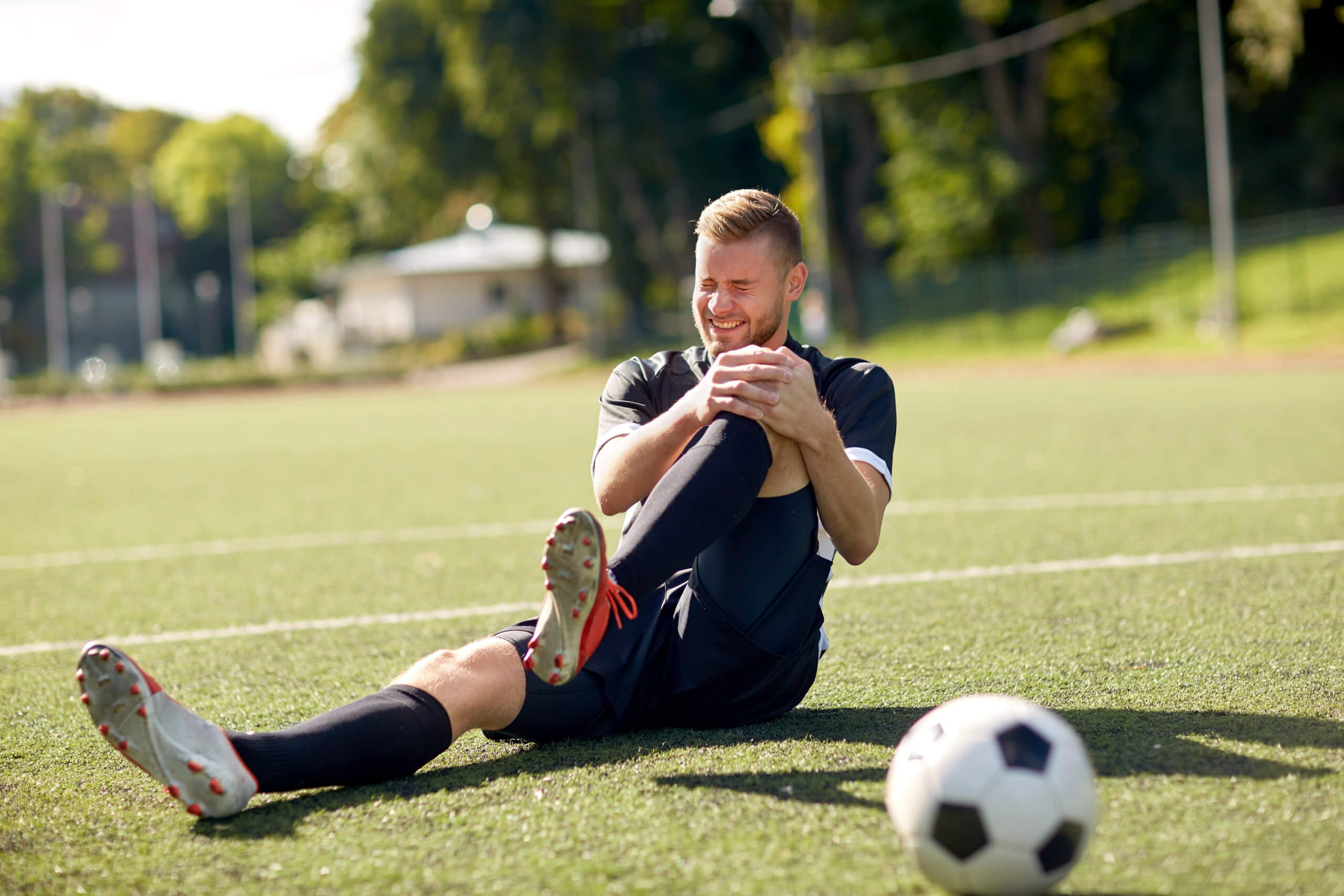Common Knee Injuries in Sports and How to Treat Them
The knee is a large, complex joint that is essential for physical activity. Regardless of what sport athletes play, their knees have to be in prime condition to compete. Given the knee’s size, complexity, and location, it is very vulnerable to injury. Common injuries include a variety of dislocations, sprains, tears, and even fractures.

While the knee is a common source of injuries for athletes, many knee injuries are very treatable. Depending on the severity of the injury, the recovery process may include noninvasive or invasive measures.
Read on to learn about the most common knee injuries in sports, how to prevent them, and where to get treatment for a knee injury.
Common Knee Injuries in Sports–Symptoms and Treatments
The knee is made up of many different tissues that work together to provide stability and flexion. A combination of bones, cartilage, ligaments, and tendons all have to work in unison for the knee to function properly. However, if one of those components gets hurt, the entire knee suffers. Here are some of the most common knee injuries for athletes:
Ligament Injuries
Ligaments are rugged bands of connective tissue that support and control movement. When you injure a ligament in the knee, it will often cause knee instability and limited movement. In terms of ligament injuries in the knee, there are four main types.

- ACL Injury: The ACL is in the center of the knee and controls both the forward movement and rotation of the shin. An ACL injury may occur because of sudden stops or changes in direction.
- PCL Injury: The PCL is also in the center of the knee but controls the backward movement of the shin. While it is a very strong ligament, it can still stretch or tear because of a violent impact.
- LCL Injury: The LCL controls much of the knee’s stability and can get injured in activities that require twisting.
- MCL Injury: The MCL stabilizes the outer knee. After a blow to the outer side of the knee, athletes can sprain their MCL.
Regardless of the ligament athletes injure, they may sprain or tear it depending on the severity of the injury. If athletes sprain a ligament, treatment does not usually require surgery. However, for injuries where athletes tear their ligament, surgery is the only way to make a recovery.
Meniscus Tears
The meniscus is cartilage that effectively acts as a shock absorber for the knee. Meniscus tears are relatively common knee injuries in sports and are often caused by sudden twists or trauma. Common symptoms of a meniscus tear include:

- Pain in the inside, outside, or back of the knee
- Locking or clicking sensations in the knee
- Swelling
- Reduced range of motion
Depending on the severity of the tear, athletes may be able to recover without surgery. However, they may require surgical treatment in some cases.
Even after treatment, the meniscus will never be as good as it once was. Thankfully, meniscus tears are relatively avoidable with the proper strengthening routine. Visit an orthopedic specialist to learn how to strengthen the surrounding muscles and head off a meniscus tear.
Bursitis
Knee bursae are sacs of fluid in the knee that help prevent the various tissues and bones in the knee from scraping together. However, athletes can injure their bursae, causing inflammation and irritation. Common causes of knee bursitis include traumatic blows and repetitive motions.
Effectively, bursitis causes friction in the knee joint that results in symptoms like:
- Pain when kneeling
- Discomfort after not moving the joint for a while
- A sharp pain followed by an aching pain
- Unusual warmth around the knee
- Decreased range of motion
Most cases of knee bursitis require minimal medical treatment. However, bursitis is easily mistakable for other knee problems. Arthritis, tendonitis, and stress fractures have similar symptoms, so visit an orthopedic specialist to diagnose your knee problem.
Knee Dislocations
A knee dislocation occurs when the femur and tibia no longer connect at the knee joint. In other words, one of the bones has been forced out of place. Knee dislocations often occur when a twisting motion is paired with a foot planted on the ground. Common symptoms of a dislocated knee include:
- Severe pain
- Visible knee deformity
- Loss of sensation below the knee
- Rapid swelling
- Loose kneecap
Dislocations are serious injuries that, depending on their severity, may require relocation or surgery.
Patellar Fractures
The patella, or kneecap, can fracture under extreme circumstances. Often the result of a significant blow or trauma, the patella fractures if the stress is too much to handle. Patellar fractures are severe injuries that require immediate medical attention. Common symptoms include:
- Noticeable defect in the kneecap
- Sudden and intense pain at the front of the knee
- Severe swelling
- Inability to move foot or shin
Under certain circumstances, athletes may not need surgical intervention to repair their knees. In those cases, a cast or splint will be enough to immobilize the knee and prevent movement while the pieces heal.
However, if the patella pieces are displaced, surgical intervention is required. Even a minor patellar fracture can eventually turn into a chronic, long-lasting knee condition without proper treatment. Therefore, it is always better to seek the help of an orthopedic specialist rather than try and hope for the best at home.
Where to Get Knee Injuries Treated
Knee injuries in sports are exceedingly common, and finding the right doctor is essential to diagnosing and treating knee injuries before they end your athletic career.
At South Island Orthopedics, we are committed to providing athletes with the treatment they need to get back on the field as soon as possible. Our team of highly trained orthopedic specialists offers the latest in both surgical and non-surgical treatments to get you back to playing the sports you love.
For the best orthopedic treatment, click here to request an appointment at one of our locations.
